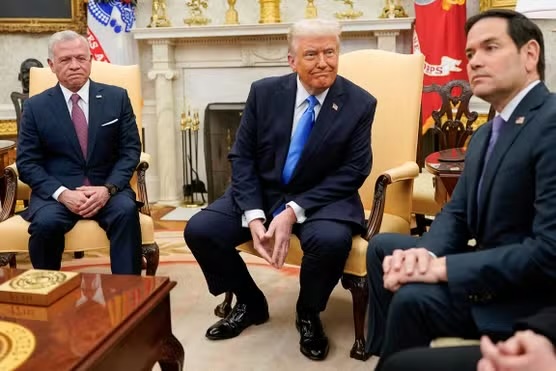Trump’s Vision for Gaza Raises Alarm
Donald Trump has outlined a vision for Gaza that challenges conventional diplomatic strategies. After meeting with King Abdullah of Jordan, Trump asserted, “We will have Gaza. We do not have to buy it. There is nothing to buy.” His statement implied a plan to secure control over the territory, portraying it as a long-term investment in stability and economic progress. “We are going to take it, we are going to hold it, we are going to cherish it,” he said, highlighting an initiative to develop the region with job opportunities for the broader Middle East.
Trump claimed that this approach would establish peace in the region. He described Gaza as having the potential to become “a diamond” and a “tremendous asset” for the Middle East.
Palestinian Displacement and the Right to Return
A major concern regarding Trump’s statements involves the fate of Palestinians in Gaza. When questioned about whether they could return, Trump stated, “They will not want to come back.” This response has drawn widespread skepticism, as it appears to support a strategy that forces Gaza’s existing population out.
Trump’s statements align with an effort to clear Gaza of its population, a plan that Palestinians have consistently rejected. His repeated insistence that they would not want to return has raised serious concerns that this approach seeks to permanently displace them, intensifying fears of forced removal.
Netanyahu Seizes Opportunity, Ceasefire Talks Collapse
Israeli Prime Minister Benjamin Netanyahu swiftly capitalized on Trump’s statements. Speaking in Hebrew to Israeli audiences, Netanyahu framed the proposal as an opportunity for “complete victory.” He described it as an end to the Oslo process, which aimed to establish a two-state solution. “You wanted a day-after plan? You got one,” Netanyahu declared, reinforcing his administration’s opposition to prior diplomatic frameworks that involved Palestinian governance.
The consequences of these remarks became evident in Israel’s approach to negotiations. Netanyahu’s government refused to engage in the second phase of ceasefire talks, which were supposed to facilitate an Israeli withdrawal from Gaza. Instead, Israeli negotiators received instructions to focus solely on finalizing the first phase while avoiding discussions on Palestinian governance.
Egypt and the International Response
Egyptian officials expressed concerns over the broader implications of Trump’s statements. While Egypt supports Gaza’s reconstruction, its leadership stressed that Palestinians must be allowed to remain in their homeland.
A report from The New York Times confirmed that international mediators and Israeli officials acknowledged Hamas’s claims regarding Israel’s ceasefire violations as accurate. Israel, after briefly allowing aid deliveries, again restricted essential supplies. Israeli forces also failed to withdraw from agreed-upon areas, directly violating the commitments outlined in the first phase of negotiations.
Hamas’s Position on the Ceasefire Agreement
Hamas maintains that it remains committed to the ceasefire as long as Israel follows the agreement. In a statement, Hamas declared, “We continue to be willing to abide by the ceasefire as long as the occupation is willing to abide by the ceasefire.” The group pointed to explicit violations, including drone flights, military vehicle presence, civilian casualties, and delays in prisoner releases. Mediators validated these claims, reinforcing that Israel has not honored the agreement.

